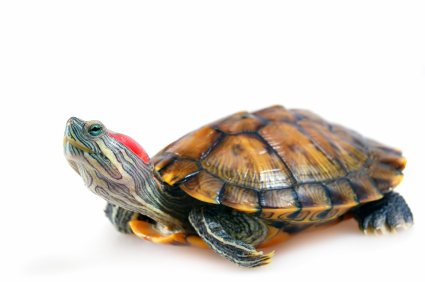Water Turtles in Koi Pond: Everything You Need to Know
Introduction
Adding water turtles to your koi pond can enhance the overall aesthetic and create a unique and captivating environment. However, it is important to know that owning turtles in a pond requires proper maintenance and care.
Types of Water Turtles to Consider
Before adding water turtles to your koi pond, it is important to consider the different types to ensure you are selecting the right species for your pond’s environment. Some of the common species include:
Red-eared Slider

The red-eared slider is a common water turtle species and a popular option for koi ponds. They have distinctive red markings on the side of their heads and are known for their active and social behaviors. They require a basking area to dry off and maintain their body temperature.
Painted Turtle

Painted turtles are another common water turtle species for koi ponds. They are characterized by their color patterns, which resemble brush strokes painted on their skin. They require a dry basking area, as well as plants and rocks to climb on.
Eastern Box Turtle

Eastern box turtles are not typical water turtles, but they can thrive in a koi pond environment. They require a mostly dry habitat with some sources of water for drinking and soaking. They are known for their unique shell patterns and for being a docile species.
Creating a Safe Environment for Water Turtles
When creating a habitat for water turtles in your koi pond, it is important to keep their safety in mind. Here are some tips to ensure a safe environment:
Provide Adequate Space
Water turtles need ample space to swim and explore, so make sure your pond is large enough to accommodate them. A good rule of thumb is to provide at least 10 square feet of surface area per turtle.
Include a Basking Area
As previously mentioned, most water turtle species require a dry basking area to regulate their body temperature and dry off. This area should be easily accessible and stable enough for them to climb onto.
Provide Hiding Spots
Hiding spots are important for water turtles to feel safe and secure, especially when they are sleeping or trying to escape from direct sunlight. Plants and rock formations can be used to create hiding spots within the pond.
Feeding Water Turtles in a Koi Pond
Water turtles in a koi pond can feed on a variety of foods, including fish, insects, and vegetation. However, it is important to ensure they are not overfed and that their diet is well-balanced. Here are some feeding tips to consider:
Feed in a Designated Area
To prevent debris from accumulating at the bottom of the pond, it is best to feed water turtles in a designated area. A basking platform or floating feeding station can be used to create a designated feeding space within the pond.
Offer a Variety of Foods
Offering a variety of food options will help ensure your water turtles are getting a well-balanced diet. Fish, insects, and vegetation, such as aquatic plants and vegetables, can all be incorporated into their diet.
Do Not Overfeed
Overfeeding can be harmful to water turtles, as it can lead to obesity and digestive issues. It is best to feed them small, frequent meals throughout the day rather than one large meal.
Maintaining Your Pond with Water Turtles
Adding water turtles to your koi pond requires some additional maintenance, but it can also benefit the overall health of the pond.
Perform Water Changes Regularly
To maintain a healthy environment for both your koi and water turtles, it is important to perform regular water changes. This will help reduce the buildup of harmful toxins and keep the water quality high.
Clean the Filter System
Water turtles produce waste that can clog up your filter system, so it is important to clean it regularly. This will help to prevent the buildup of harmful bacteria and maintain a clean and healthy pond.
Maintain the pH Balance
Water turtles can be sensitive to pH changes, so it is important to monitor and maintain the pH balance in your pond. A pH range of 7.0 to 7.5 is optimal for both koi and water turtles.
Conclusion
By following these tips, you can create a safe and healthy environment for water turtles in your koi pond. Not only will it enhance the overall aesthetic of your pond, but it can also benefit the health of your koi and promote a more diverse ecosystem within your pond.